|
 After Nkongsamba we seemed to get into a more productive cocoa zone -- maybe is
was the part of the season, maybe it was the soil, or maybe it was the elevation
and microclimate, but the trees were much more ladened with pods than we had
seen further inlands. It is interesting that we generally each cocoa
sweetened and coffee is often drunk bitter (black). But in there rare,
forms straight from the pod, the coffee bean is sweet and the cocoa pod is
bitter.
After Nkongsamba we seemed to get into a more productive cocoa zone -- maybe is
was the part of the season, maybe it was the soil, or maybe it was the elevation
and microclimate, but the trees were much more ladened with pods than we had
seen further inlands. It is interesting that we generally each cocoa
sweetened and coffee is often drunk bitter (black). But in there rare,
forms straight from the pod, the coffee bean is sweet and the cocoa pod is
bitter.
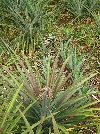  For
the next section of road plantations of new crops came faster than changes of
language. For
the next section of road plantations of new crops came faster than changes of
language.

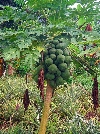 And
then orchards of papaya (pawpaw). And
then orchards of papaya (pawpaw).


 Planted
forests of of teak. Planted
forests of of teak.
   Acres
and acres
of bananas. Acres
and acres
of bananas.
  Miles
of oil palm (Remember Palmolive soap? This is the "palm" in "Palmolive".
The olive is olive oil, http://en.wikipedia.org/wiki/Colgate-Palmolive.) Miles
of oil palm (Remember Palmolive soap? This is the "palm" in "Palmolive".
The olive is olive oil, http://en.wikipedia.org/wiki/Colgate-Palmolive.)
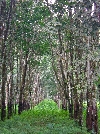
 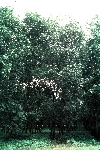 And
vast plantations of rubber trees. And
vast plantations of rubber trees.
Rubber workers typically make less than two dollars a day -- it may not
make Nikes cheap, but it keeps the costs of the input low so that proceeds can
go to the multinational companies and the professional athletes that advertise
them.
 Oh,
the workers are often supplied one or two bare rooms of housing. This
perquisite comes without indoor plumbing. The system also mean that if the
worker want to move their labor to another employer they loose the roof over
their head at the same time, or if the bread winner in the house dies everyone
else in the house become homeless. Oh,
the workers are often supplied one or two bare rooms of housing. This
perquisite comes without indoor plumbing. The system also mean that if the
worker want to move their labor to another employer they loose the roof over
their head at the same time, or if the bread winner in the house dies everyone
else in the house become homeless.

This is a table of scrap latex "cup". Usually the a rubber tree is tapped
in the morning and the "sap" drips into a cup. A few hours later the
tapper come back past all of his trees and collects the liquid latex into a can
or bucket. If more latex drips into the cup and coagulates it becomes
"cup". It is collected and eventually processed but doesn't make a high
quality product.

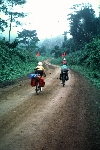  We
left the main highway and pavement at Loum. 99% of the next stretch of
road to Kumba was some form of solid (clay, rock, gravel) so don't be too
mislead by the fact that 25% of this set of pictures shows a quagmire. It
is just that quagmires seem to attract the attention of photographers. We
left the main highway and pavement at Loum. 99% of the next stretch of
road to Kumba was some form of solid (clay, rock, gravel) so don't be too
mislead by the fact that 25% of this set of pictures shows a quagmire. It
is just that quagmires seem to attract the attention of photographers.
 Some of the quagmires on this road were deep and doozies.
As much as they slowed our progress (you know all the time you spend taking pictures)
to a person we agreed that were would rather be walking our bikes around them
than being on a truck going trough, and sometimes stuck in them. Some of the quagmires on this road were deep and doozies.
As much as they slowed our progress (you know all the time you spend taking pictures)
to a person we agreed that were would rather be walking our bikes around them
than being on a truck going trough, and sometimes stuck in them.

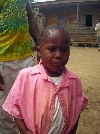 Even
with the large agro-industry economy in the are there is still plenty of
evidence of tradition, like the use of traditional style back packs? Is it by
choice or necessity. The agro-industry is connected to the global economy.
Is any of it trickling down to the rural Cameroonian's life? Even
with the large agro-industry economy in the are there is still plenty of
evidence of tradition, like the use of traditional style back packs? Is it by
choice or necessity. The agro-industry is connected to the global economy.
Is any of it trickling down to the rural Cameroonian's life?
 Snack
time on the bridge (left). The photo right understates what is happening and was
about to happened. It shows a line of students Snack
time on the bridge (left). The photo right understates what is happening and was
about to happened. It shows a line of students spread across the front of the school. What is not as clear is they are
starting to rush the fence. About five seconds later they were swarming
over the fences. It is unfortunate that there is not a time lapse
sequences of the event. Who knows how much our little disruptions set back
education in Cameroon. This wasn't an isolated incident!
spread across the front of the school. What is not as clear is they are
starting to rush the fence. About five seconds later they were swarming
over the fences. It is unfortunate that there is not a time lapse
sequences of the event. Who knows how much our little disruptions set back
education in Cameroon. This wasn't an isolated incident!
  Perhaps
the total mileage, or perhaps the rough road accelerated the deterioration of
the tire sidewall at the bead, but it was now time for repair. With a piece of
tough flexible fabric (I have also seen thin leather used) and stitching al and
thread, in short order the tire had a reinforced sidewall and was back on the
bike, inflated and underway. The skill set required are part tailor, part
cobbler and part bike mechanic. Perhaps
the total mileage, or perhaps the rough road accelerated the deterioration of
the tire sidewall at the bead, but it was now time for repair. With a piece of
tough flexible fabric (I have also seen thin leather used) and stitching al and
thread, in short order the tire had a reinforced sidewall and was back on the
bike, inflated and underway. The skill set required are part tailor, part
cobbler and part bike mechanic.

 Kumba
comes into view when you emerge from the rolling hills and forest. In
contrast to the last stretch of roadway, it is quite flat. Between the
eastern suburbs and the city center is a river. Along the river is a large
recreation complex which includes swimming pools, play Kumba
comes into view when you emerge from the rolling hills and forest. In
contrast to the last stretch of roadway, it is quite flat. Between the
eastern suburbs and the city center is a river. Along the river is a large
recreation complex which includes swimming pools, play grounds, gardens and
sports fields. It is very attractive. We haven't seen any facility
like this in any other towns we have passed. grounds, gardens and
sports fields. It is very attractive. We haven't seen any facility
like this in any other towns we have passed.
 Our linguistic odyssey stayed in the Lundu-Balong>Ngoe group
most of the day Our linguistic odyssey stayed in the Lundu-Balong>Ngoe group
most of the day as we passed from language area to language are.
Starting in Nkongsamba, Mbo is the primary indigenous language. South
of Nkongsamba, through Manjo towards Loum the primary language changes
towards Bakaka. Between Loum and Tombel there are not a lot of people,
but some place in that section the language as we passed from language area to language are.
Starting in Nkongsamba, Mbo is the primary indigenous language. South
of Nkongsamba, through Manjo towards Loum the primary language changes
towards Bakaka. Between Loum and Tombel there are not a lot of people,
but some place in that section the language
 changes
to Akoose. And then before before we reach Kumba the language changes
to Oroko in the Lundu-Balong>Oroko group. If you are confused, it is
all down in the lower left hand corner of the chart. (Both photos at
the top of this paragraph were taken near Tombel.) changes
to Akoose. And then before before we reach Kumba the language changes
to Oroko in the Lundu-Balong>Oroko group. If you are confused, it is
all down in the lower left hand corner of the chart. (Both photos at
the top of this paragraph were taken near Tombel.)
|


































 Please
contact us
Please
contact us